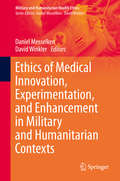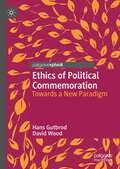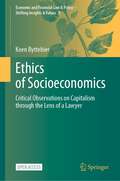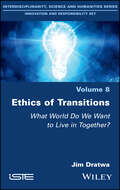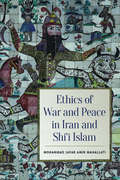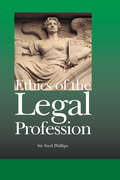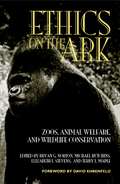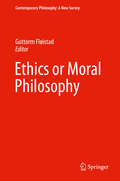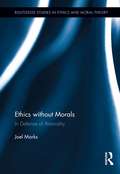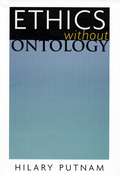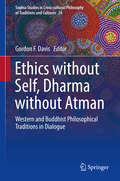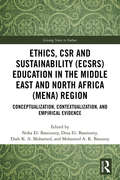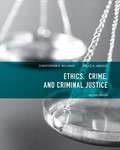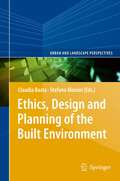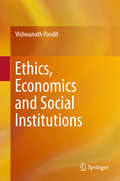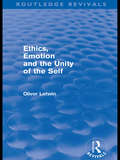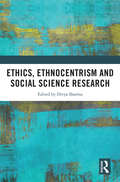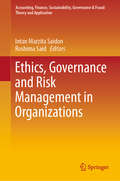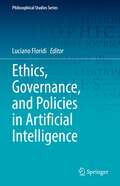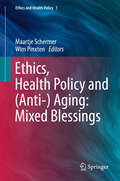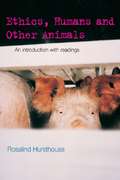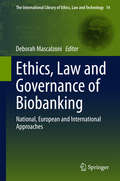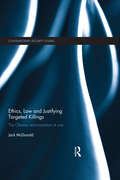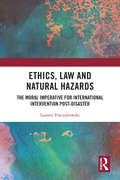- Table View
- List View
Ethics of Medical Innovation, Experimentation, and Enhancement in Military and Humanitarian Contexts (Military and Humanitarian Health Ethics)
by Daniel Messelken David WinklerThis book discusses ethical questions surrounding research and innovation in military and humanitarian contexts. It focuses on human enhancement in the military. Recently, the availability of medical enhancement designed to make soldiers more capable of surviving during conflict, as well as enabling them to defeat their enemies, has emerged. Innovation and medical research in military and humanitarian contexts may thus yield positive effects, but simultaneously leads to a number of highly problematic ethical issues. The work contains contributions on medical ethics that take into account the specific roles and obligations of military and humanitarian health care providers and the ethical problems they encounter. They cover different aspects of research and innovation such as vaccine development, medical enhancement, compassionate and experimental drug use, research and application of new technologies such as wearables, “Humanitarian innovation” to cope with scarce resources, Biometrics, big data, etc.The book is of interest and importance to researchers and policy makers involved with human enhancement, medical research, and innovation in military and humanitarian missions.
Ethics of Political Commemoration: Towards a New Paradigm (Twenty-first Century Perspectives on War, Peace, and Human Conflict)
by David Wood Hans GutbrodThis book proposes a new Ethics of Political Commemoration adapted from the Just War tradition, reflecting that remembrance is often conducted with political – and even coercive – intent. With its Ius ad Memoriam (what to commemorate) and Ius in Memoria (how to commemorate) criteria, the framework looks to guide debates that are currently inchoate so that remembrance of the past can transform relationships in the present and build a shared future. Offering a moral argument with memorable illustrations, Gutbrod and Wood draw on experiences from Armenia, Georgia, Ireland, Lebanon, and Libya, while connecting to mainstream debates in Western Europe and the United States. Bringing together an ethical tradition with the practice of conflict transformation, the framework fuses two perspectives that enrich each other. The book, in providing a first systematic presentation of the ethics, seeks to engage citizens and scholars, and help those who work to transform conflicts.
Ethics of Socioeconomics: Critical Observations on Capitalism through the Lens of a Lawyer (Economic and Financial Law & Policy – Shifting Insights & Values #8)
by Koen ByttebierThe book analyzes socioeconomic through the lens of a lawyer. In the past decade the world has witnessed some severe financial and economic crises, especially the financial crisis of 2007-2008 and the crisis caused by the COVID-19 pandemic. The author states that the socio-economic order has in the past four to five decades been thoroughly redesigned, generally favouring models that prioritize the free market over the public interest or even, more generally, government operation. He works out that during four to five decades, globalized, capitalist societies are facing a multiplicity of fundamental problems, such as: (1) increasing debt that severely burdens both the private and public sectors; (2) persistent poverty and an ever-increasing polarization between rich and poor, in addition to (3) intractable environmental problems that, fifty years after the Club of Rome's report entitled ‘Limits to growth’ (1972), has dragged the world into what in recent years has been referred to as "climate change."The book explains why all this is the direct result of value choices made from the late Middle Ages onwards, when in the Western world the societal models of that time were increasingly abandoned for a societal model that came to rely on the primacy of economic interests. The book not only subjects the ethical choices but also examines various problems it has caused and probes for possible ways out.This is an open access book.
Ethics of Transitions: What World Do We Want to Live in Together?
by Jim DratwaThis book covers all forms of ethical assessment of research and innovation at the European Commission, including the implications of the concept of RRI which has emerged as a new framework to be used by the European Commission, and indeed including the newer concepts of Open Innovation and Open Science which are designed to subsume and reconfigure RRI. The book can be used as a &‘how to&’ guide to understand and navigate the ethical and societal demands in developing European research projects; it also pushes the reflection and reflexivity further, bringing provoking new (and also some very old) perspectives to bear on ardent debates in studies of expertise, ethics and policy making.
Ethics of War and Peace in Iran and Shi'i Islam
by Mohammed Jafar MahallatiNearly four decades after a revolution, experiencing one of the longest wars in contemporary history, facing political and ideological threats by regional radicals such as ISIS and the Taliban, and having succeeded in negotiations with six world powers over her nuclear program, Iran appears as an experienced Muslim country seeking to build bridges with its Sunni neighbours as well as with the West.Ethics of War and Peace in Iran and Shi'i Islam explores the wide spectrum of theoretical approaches and practical attitudes concerning the justifications, causes and conduct of war in Iranian-Shi'i culture. By examining primary and secondary sources, and investigating longer lasting factors and questions over circumstantial ones, Mohammed Jafar Amir Mahallati seeks to understand modern Iranian responses to war and peace. His work is the first in its field to look into the ethics of war and peace in Iran and Shi'i Islam. It provides a prism through which the binary source of the Iranian national and religious identity informs Iranian response to modernity. By doing so, the author reveals that a syncretic and civilization-conscious soul in modern Iran is re-emerging.
Ethics of the Legal Profession
by Sir Fred PhillipsIn countries outside the developed world, although writers have written commentaries on specific legal codes, very little attention has been given to legal writing which has focused specifically on the ethics of the legal profession. This book makes a special contribution in that regard providing, as it does, a comparative study of prevailing efforts to enhance ethical standards in a profession potentially in crisis and under much public scrutiny. Countries which have been examined include the UK, the US, Canada, South Africa, and countries in the Pacific, South East Asia and the Caribbean. Valuable guidance and learning are provided on such topical issues as wasted costs orders, conflicts of interests, legal and judicial codes, confidentiality, privilege and the ethics of the criminal process, where the jury system comes in for critical evaluation. This book will be a valuable text on the ethics and status of the profession. It will be of considerable interest to law students, practitioners and legal academics, Bar Associations, Attorneys-General and Directors of Public Prosecutions as well as members of the judiciary.
Ethics on the Ark: Zoos, Animal Welfare, and Wildlife Conservation
by Terry Maple Elizabeth Stevens Michael Hutchins Bryan G. NortonEthics on the Ark presents a passionate, multivocal discussion--among zoo professionals, activists, conservation biologists, and philosophers--about the future of zoos and aquariums, the treatment of animals in captivity, and the question of whether the individual, the species, or the ecosystem is the most important focus in conservation efforts. Contributors represent all sides of the issues. Moving from the fundamental to the practical, from biodiversity to population regulation, from animal research to captive breeding, Ethics on the Ark represents an important gathering of the many fervent and contentious viewpoints shaping the wildlife conservation debate.From the Trade Paperback edition.
Ethics or Moral Philosophy
by Guttorm FløistadThis volume examines a variety of philosophical approaches that seek to formulate practical guidelines or norms for human actions and behavior in different areas of society, including politics, cultural traditions, the environment, business management, architecture, and medicine. Written by a team of international authors, this volume features thirteen surveys. It begins with an exploration of ethics in politics and cultural traditions. From genocide to the unequal distribution of wealth, it examines many of the harms that currently affect societies throughout the world and considers a way that those in politics can follow to provide better care for all their populations. Next, the book looks at the relation between ethics and cultural traditions. It features a paper that examines the tension that often exists between the past and the present, with a special focus on the history of India. This volume also considers the idea of a universal system of ethics, presents a practical approach to value-based management in private and public organizations, and examines ethics in medicine. In addition, this volume includes coverage of a new type of ethics called Eco-ethica, proposed by the Japanese philosopher Tomonobu Imamichi, which seeks to answer the question of how men and women can "live better" or "live together with each other" in a systematized, technological age.
Ethics with Aristotle
by Sarah BroadieSarah Broadie gives an argued account of the main topics of Aristotle's ethics: eudaimonia, virtue, voluntary agency, practical reason, akrasia, pleasure, and the ethical status of theoria. She explores the sense of "eudaimonia," probes Aristotle's division of the soul and its virtues, and traces the ambiguities in "voluntary."
Ethics without Morals: In Defence of Amorality (Routledge Studies in Ethics and Moral Theory)
by Joel MarksIn this volume, Marks offers a defense of amorality as both philosophically justified and practicably livable. In so doing, the book marks a radical departure from both the new atheism and the mainstream of modern ethical philosophy. While in synch with their underlying aim of grounding human existence in a naturalistic metaphysics, the book takes both to task for maintaining a complacent embrace of morality. Marks advocates wiping the slate clean of outdated connotations by replacing the language of morality with a language of desire. The book begins with an analysis of what morality is and then argues that the concept is not instantiated in reality. Following this, the question of belief in morality is addressed: How would human life be affected if we accepted that morality does not exist? Marks argues that at the very least, a moralist would have little to complain about in an amoral world, and at best we might hope for a world that was more to our liking overall. An extended look at the human encounter with nonhuman animals serves as an illustration of amorality’s potential to make both theoretical and practical headway in resolving heretofore intractable ethical problems.
Ethics without Ontology
by Hilary PutnamIn this brief book one of the most distinguished living American philosophers takes up the question of whether ethical judgments can properly be considered objective--a question that has vexed philosophers over the past century. Looking at the efforts of philosophers from the Enlightenment through the twentieth century, Putnam traces the ways in which ethical problems arise in a historical context. Hilary Putnam's central concern is ontology--indeed, the very idea of ontology as the division of philosophy concerned with what (ultimately) exists. Reviewing what he deems the disastrous consequences of ontology's influence on analytic philosophy--in particular, the contortions it imposes upon debates about the objective of ethical judgments--Putnam proposes abandoning the very idea of ontology. He argues persuasively that the attempt to provide an ontological explanation of the objectivity of either mathematics or ethics is, in fact, an attempt to provide justifications that are extraneous to mathematics and ethics--and is thus deeply misguided.
Ethics without Self, Dharma without Atman: Western and Buddhist Philosophical Traditions in Dialogue (Sophia Studies in Cross-cultural Philosophy of Traditions and Cultures #24)
by Gordon F. DavisThis volume of essays offers direct comparisons of historic Western and Buddhist perspectives on ethics and metaphysics, tracing parallels and contrasts all the way from Plato to the Stoics, Spinoza to Hume, and Schopenhauer through to contemporary ethicists such as Arne Naess, Charles Taylor and Derek Parfit. It compares and contrasts each Western philosopher with a particular strand in the Buddhist tradition, in some chapters represented by individual writers such as Nagarjuna, Vasubandhu, Santideva or Tsong Khapa. It does so in light of both analytic concerns and themes from the existentialist and phenomenological traditions, and often in an ecumenical spirit that bridges both analytic and continentalist approaches. Some of the deepest questions in ethics, dealing with the scope of agency, value-laden notions of personhood and the nature of value in general, are intertwined with questions in metaphysics. One set of questions addresses how varying conceptions of selfhood relate to moral values (e.g. the concern of self or selves for the well-being of others); another set of questions addresses how a conception of oneself or one’s selves should or should not affect how one thinks of happiness, or eudaimonia, or – in classical Indian terms – artha, sukha or nirvana. Western philosophy has featured discussion of both, but some would argue that certain traditions of Asian philosophy have offered a more sustained and even treatment of both sets of questions. The Buddhist tradition in particular has not only featured much discussion on both fronts, but has attracted many contemporary philosophers to its distinctive spectrum of approaches, and to what is – from many ‘Western’ points of view – a seemingly subversive analysis of ego, selfhood and personhood, whether in metaphysical, phenomenological or other incarnations.
Ethics, CSR and Sustainability: Conceptualization, Contextualization, and Empirical Evidence (Giving Voice to Values)
by Noha El-Bassiouny Dina El-Bassiouny Ehab K. A. Mohamed Mohamed A. K. BasuonyThe Middle East and North Africa (MENA) region is undergoing significant socio-political and developmental transition. Although interest in corporate social responsibility (CSR) in the region is growing, little research has addressed corporate social responsibility education and its potential impact. CSR has an important role to play in the socio-economic development of the Middle East and North Africa due to the volatility and developmental needs of the region. Recent research has highlighted that the vitality of the institutional environment and the needs of multiple stakeholders in CSR are not necessarily consistent with the notion of CSR in the West. This book compiles conceptual, contextual, and empirical research that addresses the concepts of CSR, ethics, and sustainability education in the MENA region, with a special emphasis on how educators can bridge to the Giving Voice to Values approach. This book presents a much-needed portfolio of articles from authors based in Egypt, Morocco, the Sultanate of Oman, Qatar, and the United Arab Emirates (UAE), highlighting first an overview of the topic and its corresponding publications in the MENA region, then presenting several exemplary cases related to ECSRS application in various countries.
Ethics, Crime, and Criminal Justice (Second Edition)
by Christopher R. Williams Bruce A ArrigoThis comprehensive, provocative text meaningfully examines ethical theories and their application to current issues, controversies, and professional scenarios in law, crime, and justice. It introduces students to the foundations of the study of ethics and morality; examines prominent moral and ethical themes, conflicts, and struggles in criminology and criminal justice; and explores the conceptual and practical value of key ethical concepts, principles, and arguments. This edition is extensively updated and revised for greater clarity, cohesiveness, and accessibility. An all-new chapter demonstrates practical application of normative frameworks to ethical dilemmas, and another largely new chapter introduces game theory, evolutionary psychology, and related concepts. Readers will find expanded discussions of social contract, cognitive neuroscience, Carol Gilligan's ethic of care, and much more.
Ethics, Design and Planning of the Built Environment
by Stefano Moroni Claudia BastaThe book proposes a set of original contributions in research areas shared by planning theory, architectural research, design and ethical inquiry. The contributors gathered in 2010 at the Ethics of the Built Environment seminar organized by the editors at Delft University of Technology. Both prominent and emerging scholars presented their researches in the areas of aesthetics, technological risks, planning theory and architecture. The scope of the seminar was highlighting shared lines of ethical inquiry among the themes discussed, in order to identify perspectives of innovative interdisciplinary research. After the seminar all seminar participants have elaborated their proposed contributions. Some of the most prominent international authors in the field were subsequently invited to join in with this inquiry. Claudia Basta teaches "Network Infrastructures and Mobility" at Wageningen University. Between 2009 and 2011 she worked as Coordinator of the 3TU Centre of Excellence for Ethics and Technology of Delft University, where she completed her post-doc research on the shared areas of investigation between risk theories, planning theories and ethical inquiry. Her main research interests concern the matter of assessing and governing technological risks in relation to sustainable land use planning. She wrote a number of journal articles and contributions to collective books on these themes. Stefano Moroni teaches "Land use ethics and the law" at Milan Politecnico. His main research interests concern planning theory and ethics. He is the author of a number of books and journal articles. Recent publications (as co-author): Contractual Communities in the Self-Organizing City (Springer 2012).
Ethics, Economics and Social Institutions
by Vishwanath PanditThe book highlights the ethical aspects and issues that are inherent to economics in the context of today's prominent social institutions. It reviews a range of problems concerning dominant social institutions, namely markets, government agencies, corporate entities, financial networks, and religious systems. Further, in each case, the book takes a detailed look at the economic problems as they arise within a broader sociological and political environment, taking into account the respective ethical/philosophical paradigms. It analyzes from an ethical point of view topics like the evolution of economic thought, happiness and spirituality, and human values in relation to ethics.
Ethics, Emotion and the Unity of the Self (Routledge Revivals)
by Oliver LetwinThis Routledge Revival reissues Oliver Letwin’s philosophical treatise: Ethics, Emotion and the Unity of the Self, first published in 1987, which concerns the applicability of the artistic classifications of romanticism and classicism to philosophical doctrine. Dr Letwin examines three particular theses associated with philosophical romanticism: that there is within us a high self and a low self; that there is a moral self in inevitable conflict with an amoral self; and that there is a rational self disjoined from and in tension with a passionate self. He argues that these notions of philosophical romanticism are, in fact, radically false, and instead takes the view that man can be a unified being of the sort described by philosophical classicists. But man has to work to achieve this status. The intrinsic unity of the human personality is not a guarantee of a coherent life, but a challenge to be met.
Ethics, Ethnocentrism and Social Science Research
by Divya SharmaThis book addresses the ethical and methodological issues that researchers face while conducting cross-cultural social research. With globalization and advanced means of communication and transportation, many researchers conduct research in cross-cultural, multicultural, and transnational settings. Through a range of case studies, and drawing on a range of disciplinary expertise, this book addresses the ethics, errors, and ethnocentrism of conducting law and crime related research in settings where power differences, as well as stereotypes, may come into play. Including chapters from scholars across cultures and settings – including Greece, Canada, Vienna, South Africa, India, and the United States – this book provides an invaluable survey of the issues attending cross-cultural social justice research today. Engaging issues confronted by all cross-cultural researchers this book will be invaluable to those working across the social sciences as well as professionals in criminal justice and social work.
Ethics, Governance and Risk Management in Organizations (Accounting, Finance, Sustainability, Governance & Fraud: Theory and Application)
by Roshima Said Intan Marzita SaidonThis book brings together research works, ideas, critical reviews and strategic proposals encompassing various ethical and corporate governance issues in workplaces and organizations around the globe. For the most part, organizations are managed by policies, guidelines and systems. Good ethics and solid corporate governance help to tie these three elements together so that an effective and successful organization is established. Alongside corporate governance, ethics play an integral role in ensuring the long term survival of businesses. Multidisciplinary in approach, this book provides a platform for scholars and researchers from various backgrounds and interdisciplinary expertise to showcase their research work, ideas, critical review and strategic proposals on the ethical aspects, governance and risk management issues in organizations. The book includes discussions of ethical issues in a variety of organizations around the globe including the non-profit and non-governmental sector and also provides readers with ideas, guidelines and strategic recommendations for handling such issues.
Ethics, Governance, and Policies in Artificial Intelligence (Philosophical Studies Series #144)
by Luciano FloridiThis book offers a synthesis of investigations on the ethics, governance and policies affecting the design, development and deployment of artificial intelligence (AI). Each chapter can be read independently, but the overall structure of the book provides a complementary and detailed understanding of some of the most pressing issues brought about by AI and digital innovation. Given its modular nature, it is a text suitable for readers who wish to gain a reliable orientation about the ethics of AI and for experts who wish to know more about specific areas of the current debate.
Ethics, Health Policy and (Anti-) Aging: Mixed Blessings
by Wim Pinxten Maartje SchermerThis volume focuses on the ethical and philosophical issues that arise in an aging society, and the implications of these issues for healthcare and social policy. After a brief overview of biomedicine's changing approach of ageing and longevity and of the new expectations that these changes generate, various ethical, social, and policy issues that surround aging and longevity are discussed. First, the images and social meanings of aging and old age in our society are explored, including their normative dimensions and implications for policy. Next, ethical issues in the care for frail elderly are discussed, as well as notion of good care and end-of-life decisions. Finally, the ethical and social implications of emerging possibilities for anti-aging and lifespan extension are considered. The book concludes with an overview of the relevance of the issues discussed for policy making on professional, national and international levels.
Ethics, Humans and Other Animals: An Introduction with Readings (Philosophy and the Human Situation)
by Rosalind HursthouseThis introductory textbook is ideally suited to newcomers to philosophy and ethical problems. Rosalind Hursthouse carefully introduces the three standard approaches in current ethical theory: utilitarianism, rights, and virtue ethics. She links each chapter to readings from key exponents such as Peter Singer and Mary Midgley and asks students to think critically about these readings for themselves. Key features include clear activities and activities, chapter summaries and guides to further reading.
Ethics, Law and Governance of Biobanking
by Deborah MascalzoniBiobank research and genomic information are changing the way we look at health and medicine. Genomics challenges our values and has always been controversial and difficult to regulate. In the future lies the promise of tailored medical treatments and pharmacogenomics but the borders between medical research and clinical practice are becoming blurred. We see sequencing platforms for research that can have diagnostic value for patients. Clinical applications and research have been kept separate, but the blurring lines challenges existing regulations and ethical frameworks. Then how do we regulate it? This book contains an overview of the existing regulatory landscape for biobank research in the Western world and some critical chapters to show how regulations and ethical frameworks are developed and work. How should international sharing work? How design an ethical informed consent? An underlying critique: the regulatory systems are becoming increasingly complex and opaque. The international community is building systems that should respond to that. According to the authors in fact, it is time to turn the ship around. Biobank researchers have a moral responsibility to look at and assess their work in relation to the bigger picture: the shared norms and values of current society. Research ethics shouldn't only be a matter of bioethicists writing guidelines that professionals have to follow. Ethics should be practiced through discourse and regulatory frameworks need to be part of that public discourse. Ethics review should be then not merely application of bureaucracy and a burden for researchers but an arena where researchers discuss their projects, receive advice and practice their ethics skills.
Ethics, Law and Justifying Targeted Killings: The Obama Administration at War (Contemporary Security Studies)
by Jack McDonaldThis book examines the normative debates around the American use of targeted killings. It questions whether the Obama administration’s defence of its use of targeted killings is cohesive or hypocritical. In doing so, the book departs from the disciplinary purpose of international law, constitutional law and the just war tradition and instead examines discipline-specific defences of targeted killings to identify their requisite normative principles in order to compare these norms across disciplines. The methodology used in this book means that it argues that targeted killings are only defensible as acts of war, but it also highlights the normative role of accountability and responsibility in this defence. In doing so, it offers an argument that the use of ‘pattern of life’ killings by the CIA falls outside the defence offered by the Obama administration, but that this same type of targeting could be used by the military due to differing standards/mechanisms of responsibility assignment in these organisations. The book thus provides a way of investigating contemporary wars where the conduct of war lacks the traditional hallmarks of conventional warfare. Furthermore, by drawing attention to differing normative concepts that underpin competing interpretations of law and morality, it provides a way of analysing contemporary political violence in an interdisciplinary fashion without seeking to displace single disciplinary study. This book will be of much interest to students of military studies, ethics of war, foreign policy, international security and IR.
Ethics, Law and Natural Hazards: The Moral Imperative for International Intervention Post-Disaster
by Lauren TraczykowskiThis book argues that the international community has a moral duty to intervene on behalf of a population affected by a natural hazard when their government is either unable or unwilling to provide basic, life-saving assistance. The work draws on law, international relations theory, and political philosophy to articulate that non-response to a natural hazard is unethical. In providing policy suggestions the author articulates what should happen based on an ethical analysis. Readers will thus gain an ethical lens with which to view intervention in the aftermath of a natural hazard. The book encourages readers to consider the nuances of arguments from various disciplines about whether or not intervention is appropriate. Whilst arguing throughout that an intervention policy in response to natural hazards should be developed by the international community, the study also accounts for why intervention should only be used in very limited situations. This interdisciplinary approach makes the book essential reading for researchers, academics and policy-makers working in the areas of international law, humanitarian studies, human rights, international relations and political science.
